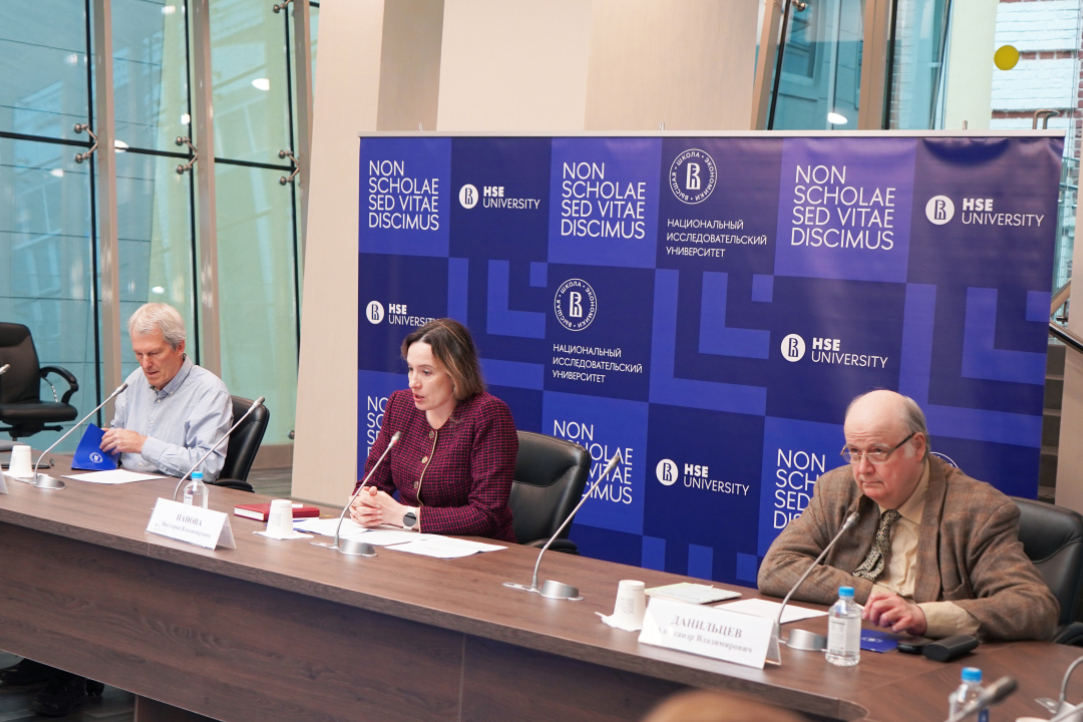Roundtable Discussion on Economic Partnership of the BRICS States and Prospects for Multilateral Cooperation in the Eurasian Space Held in Moscow
On May 14, HSE University hosted a round table focused on the economic partnership of the BRICS countries and the prospects for multilateral cooperation in the Eurasian space. The event was organized as part of Russian 2024 BRICS Chairship. Vladimir Zuev, Head of the Section for Economic Cooperation, Trade, Infrastructure, and Energy, and Professor at HSE UniversityInstitute of Trade Policy, moderated the discussion.

During the meeting, participants delved into various topics, including trade and investment dynamics, energy and economic collaboration within BRICS, and the role of special economic zones in fostering cooperation and attracting investments among the group's nations. Victoria Panova, Vice Rector at HSE University and Head of the BRICS Expert Council–Russia, was actively engaged in the discussion.
Dr. Panova highlighted the strategic significance of trade, economic, and financial policy among the multiple spheres of activity within the group. "The BRICS' influence in the global economy is steadily increasing every year. If we look back to 2010, the collective GDP of the BRICS nations accounted for approximately 26.6% of the global total. Last year, this figure had risen to 32.1%. <…> BRICS continues to develop and grow, gaining more and more authority within the global economy. Following the expansion, the BRICS member states now represent 37% of the global GDP," she stated. Vice Rector also underscored the dynamic growth in trade activity among the BRICS nations and outlined key areas of focus moving forward. "The development of trade and economic relations between the member states, overcoming crisis trends, and jointly countering global restrictive measures and challenges remain top priorities for BRICS. We continue to spearhead the promotion and advancement of a multipolar world across politics, security, economics, and finance. The ultimate goal of our collective efforts is to attain stable economic development and prosperity not only within BRICS but also for other countries representing the Global Majority," added Victoria Panova. She also emphasized the creation of a unified payment system as a substitute for the existing tools.
Andrey Spartak, Corresponding Member of the Russian Academy of Sciences and Head of International Trade and Foreign Trade Department at Russian Foreign Trade Academy of the Ministry of Economic Development, delved into the practical aspects of developing trade cooperation within BRICS. He highlighted that mutual trade among the BRICS nations is experiencing accelerated growth compared to foreign trade. "BRICS should shift its focus from internal interaction to formulating their vision of the prospects and principles for shaping a new economic world order," Andrey Spartak said. Additionally, he underscored the increasing relevance of the BRICS agricultural agenda, citing factors such as population and middle-class growth, urbanization, and sustained demand for basic food, among others.
Another topic raised during the discussion was leveraging indices and statistical indicators to assess the fundamental characteristics of BRICS. Alexander Daniltsev, Director of the Institute of Trade Policy at HSE University, elaborated on this aspect, emphasizing key indices and indicators, such as GDP and the trade complementarity index. "I believe this is the first step towards illustrating the mutual dynamics and prevailing trends within BRICS trade," he pointed out.
Participants also discussed the dichotomy between trade and investment within BRICS, specifically addressing the varying rates of growth in trade and investment. Experts from HSE University, including Vladimir Zuev, Andrey Voropai, Daria Gribanova, and Kirill Gorshkolepov presented potential strategies to incentivize foreign investment inflows into BRICS as part of their report. "Firstly, we need to focus on deepening the integration of the African region into the BRICS trade and economic system, particularly following its expansion in 2024. Africa boasts a history of successful collaboration with the union of developing states across various formats. Moreover, individual countries within the group actively invest in diverse sectors of the African economy. Russia is deeply engaged in cooperation with African countries, particularly in the field of natural resource extraction. <…> Secondly, we need to further develop the policy aimed at liberalizing trade and investments. <…> And thirdly, special attention should be paid to the development of special economic zones in the BRICS countries. These zones serve as crucial instruments for attracting investments and stimulating exports," explained Andrey Voropai, Expert at the HSE University Faculty of World Economics and International Affairs. The experts also highlighted the UAE entry into BRICS could potentially bolster investment activity within the group, given its significant role as a hub for cash flows. Moreover, in the future, the UAE might evolve into a key gateway for investment flows among the BRICS member states.
The final part of the meeting featured a report on the evolving role of nuclear energy in the energy cooperation among the BRICS nations. "The BRICS countries have been cooperating for a long time in various areas of nuclear energy, while the atom acquires a new meaning and significance in the context of climate change and the efforts of the BRICS members to reduce emissions," explained Vadim Kuznetsov, Head of the Group of Young Experts on Resource Management at the UN Economic Commission for Europe and Director of Sustainable Development and Climate Change Programmes at the BRICS Youth Energy Agency. He stressed that BRICS is a major player in climate negotiations, given that the combined emissions from the BRICS countries constitute nearly half of the global carbon emissions. "This is a very important lever in the negotiation process under the UN Framework Convention on Climate Change since the participation of the BRICS nations is pivotal in addressing climate change," Mr Kuznetsov added. He also underscored a shared consensus within BRICS regarding the imperative to advance nuclear energy, noting that eight out of ten member countries are actively engaged in its development.
